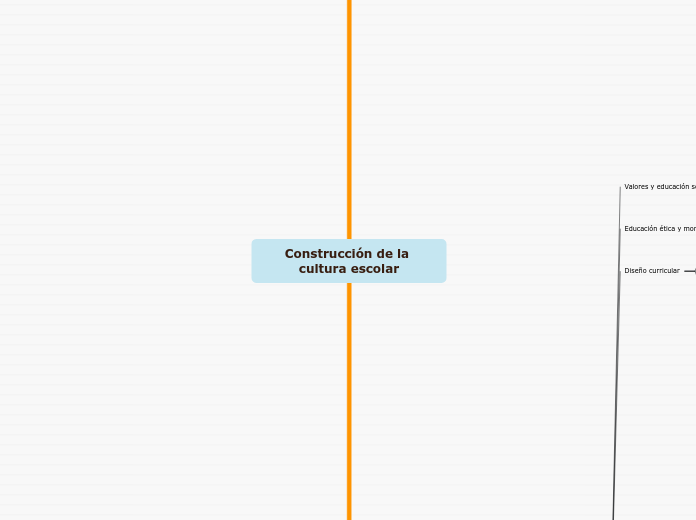作者:Nicol Herrera 4 年以前
208
Construcción de la cultura escolar

作者:Nicol Herrera 4 年以前
208

更多类似内容

To name your story, you have to think about the overall message and what you want your audience to understand from the story. Also, make it relevant and easy to remember.
There wouldn't be any tension and excitement in your story if there weren't any obstacles in your character's way.
A story is nothing more than a character overcoming a series of difficulties to reach the desired goal. Obstacles usually create suspense and conflict. In overcoming obstacles, there is growth: weak becomes strong; hatred turns into love; sadness into happiness; wrong into right; lies into truth; or evil becomes good.
See a few examples below:
TERRITORIO RURAL
necesita
adaptación de recursos
en
educación física
favorece al intercambio entre pueblos cercanos utilizando la bicicleta
comunicación con otros alumnos
aspectos sociomotrices
da a conocer otra perspectiva del medio natural
como recurso
como espacio
enseña a los alumnos a utilizar el medio natural de forma constructiva
entorno natural
condiciona
el desarrollo a la EFI
necesidades educativas
formas de vivir
potencial de experiencias interdiciplinares
condicionantes de la práctica
temporalidad
momentos de práctica
influye el clima
recursos naturales
accesibilidad
FACTORES QUE INFLUYEN
CONDICIONANTES DEL APRENDIZAJE
The middle of the story is where you add layers of complications that will lead to the end. Reveal more about the character's journey. Did their personality go through changes? How did they overcome the challenges? And as you build up the story’s central conflict, make it more personal to that character. Also, from the middle act, you have to lead into the final act.
ambiente
This is the moment when the main character surpasses the last obstacle and finally faces their greatest challenge.
The climax usually follows one of these patterns:
Type in your answer.
compromiso familiar
vulnerabilidad
características del niño
Your character(s) need(s) motivation in order to solve the challenge(s).
patologías
Secondary characters might also have motives that lead them to cross paths with the main character or which might trigger them to help the main character.
estilos de aprendizaje
desarrollo cognitivo
aprendizaje significativo
Secondary characters also might have motivs beacuse of which they may cross path with main character or which might trigger them to help the main character.
CONDICIONANTES DE LA ENSEÑANZA
The ending of a story is essential. We all know that if the ending is weak, what happened before loses its importance. So make it unpredictable, but fair. A resolved ending answers all the questions and ties up any loose threads from the plot.
profesor
Why does your character need to confront this challenge? What does he/she expect to accomplish by solving it?
See a few examples:
expectativa
afectividad
This is the closure section of the story.
See examples of possible outcomes below:
innovación pedagógica
colavoracion
planificación
Try answering these questions in order for you to come up with a closure:
- Have all problems been solved?
- Is it clear what happens with all your characters in the story?
- Has the challenged transformed your main character?
- How do the characters feel in the end?
evaluación
dificultades pedagógicas
Try answering these questions to come up with a closure:
- Have all the problems been solved?
- Is there a clear picture of what happens with each character in the story?
- Has the challenge transformed your main character?
- How do the characters feel in the end?
CONDICIONANTES CURRICULARES
Each story has a main character and that character usually needs to solve a problem or challenge. The character's challenge is the one that creates tension throughout the story.
curriculum
Type in any other challenges which other characters in the story need to face.
práctica educativa
capacitación docente
políticas educativas
In most stories, there are 3 challenges. The number 3 is a mystical number symbolizing completeness. Try to come up with interesting challenges with which your character needs to struggle.
See a few examples below:
enseñanza intercultural bilingüe (EIB)
mercado educacional
movilidad escolar
medición
intervención social
materiales
CARACTERÍSTICAS
AULAS MULTIGRADO
utilizan el
constructivismo
aplican
metodología activa-participativa
para
crear contextos de aprendizajes significativos y cooperativos
conforma
microsistema social
promueve
modelo, cultura de comunidad rural
valores
sana convivencia
relaciones sociales
se refiere a
Diversidad de edades atendidas por un mismo maestro
genera
alumnos tutores
autonomía de aprendizaje
requiere de
asunción de cambios metodológicos
incorporar nuevas formas de adquisición de aprendizajes centrados en el alumnado
asunción del modelo cooperativo
trabajo en coordinación
trabajo en grupo
adecuación del curriculum
Estrategias y estilos de técnica y enseñanza
Fomentar la autonomia
Incorporación de ejes transversales: Problemas y realidades relevantes en la sociedad. Desarrollo del campo de los valores en la educacion.
Formación inicial y permanente del profesorado
Valores forzados
Familia
Primera instancia donde el niño adquiere normas, actitudes y valores.
Principal escenario para el desarrollo ético y moral del alumno
Planteamientos competitivos, selectivos y restringidos
Centro de referencia de los niños
La TV como gran oponente
Imagen que se transmite del deporte (agresividad,competitividad, rivalidad, exclusiones)
Todo el centro educativo se debe integrar y sumir el trabajo de valores
Profesor lo crea
Mas perjudicado por el comportamiento de los alumnos
Factores que influyen
Didácticos: Metodología, evaluación y contenidos (Fomentar la utilización de la metodología cooperativa)
Psicológicos: Comportamiento del profesor
Físicos: arquitectónicos y materiales
Subtopic
Principal agente
Profesor de educación física
Deporte como Herramienta para inculcar valores
Conductas ante la comunicación verbal acaparan una mayor atención
Decide el valor pedagógico de la practica deportiva
Propósito: Producir adherencia al entrenamiento deportivo y las clase de EFI como estilo de vida
"Actuación del profesorado": relacion con los alumnos
Sensibilidad del profesorado
Aspectos personales (edad, genero, formación,experiencia profesional)
KDKDKDKDK
Dotar al alumno de
Ambitos motriz, cognitivo y moral
Prioriza contenidos procedimentales
transmiten valores pero no explícitamente